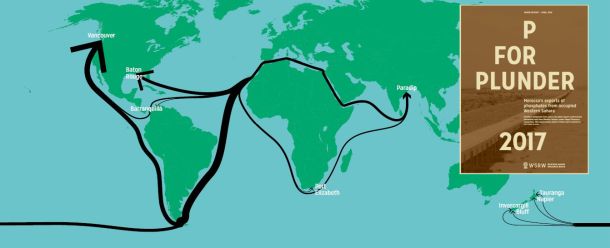
Norwegian Council for Africa: When The Norwegian Council for Africa visited occupied Western Sahara between Christmas and New Year’s Eve, we photographed a freighter that later turned out to be Norwegian. The shipping company Atlantic RTI confirmed the fish transport and said they dislike that their ship has been utilised in the occupied area.
By Magnus Bjørnsen
Norwegian Council for Africa
03 March 2009
Trade with occupied Western Sahara is in conflict with the advice of the Norwegian Ministry of Foreign Affairs. It is also in conflict with the wishes of the occupied Sahrawi population and in violation of international law. The fishing industry in Western Sahara employs Moroccan settlers and contributes to the income of the Moroccan national treasury. The area has been illegally occupied by Morocco since 1975.
A ship owned by the Norwegian shipping company Atlantic RTI AS has nevertheless been utilised to transport frozen fish from the occupied country.
The ship Remora 1, to the left in the photograph, is owned by a Norwegian shipping company that so far is not known among the controversial commercial activities in Western Sahara. The photo was taken by Magnus Bjørnsen, Executive Director of The Norwegian Council for Africa, on Christmas Eve of 2008 in the harbour of Dakhla, in the occupied area of Western Sahara. Bjørnsen went to Western Sahara during Christmas to learn more about the conflict.
Chairman of Atlantic RTI, Johann Lønnmark Werner, has confirmed to The Norwegian Council for Africa that their vessel visited Dakhla harbour in December. He dislikes that the ship has been utilised for this purpose. He explained that it is a Dutch bank that now is responsible for operating the ship.
“How do you feel about a ship you own being involved in trade that the Norwegian Ministry of Foreign Affairs, among others, advices strongly against?
“I do not like it and would never have been involved in it myself. But in this context we have not played a part that enabled us to participate in the decision. If we had had the right of disposal over the ship and found out about this, then we would not have approved it,” Werner told The Norwegian Council for Africa.
“For a while we rented out the ship to a Greek charterer, but they stopped paying us this autumn – with the result that the Dutch bank HBU took over the operation. Since December 2008 the vessel has been operated by HBU,” Werner said.
Unethical
“It is good to know that the shipping company acknowledges the ethical dilemmas of this and say that they would not have approved the operation if they had had the possibility,” Ronny Hansen, chairman of the Norwegian Support Committee for Western Sahara, said.
The Support Committee is one of the member organisations of The Norwegian Council for Africa.
“It is also noteworthy that other Norwegian shipping companies in such situations have contacted the charterer and asked them to stop the unethical operations,” Hansen told the Council.
He says that the Support Committee will send a letter to Atlantic RTI, demanding that the shipping company clearly requests their charterers to stay away from the occupied country.
“The Sahrawis are unambiguously against this form of international support for the occupation. Hardly any Sahrawis are employed in the fishing industry, and it is totally controlled by Moroccan authorities and commercial interests. It contributes only to strengthen a brutal and unlawful occupation. The Norwegian shipping companies have a moral obligation to prevent their ships from being utilised to finance the occupation and to support Morocco’s claim for Western Sahara,” Hansen said.
Norwegian Fishing in Occupied Country
One hypothesis is that Remora 1 transported fish that has been fished by the Norwegian fishing company Sjøvik.
The Sjøvik group has been established in the occupied areas for several years, and their fishing for the Moroccans has been covered by the Norwegian media on several occasions. Sjøvik’s involvement has been criticised by a series of Norwegian politicians and organisations and the president of the Western Sahara republic. To the right of Remora 1 on the photograph lies Sjøvik’s fishing boat Midøy Dakhla, which sails under the Moroccan flag in the occupied area.
Sjøvik says that Western Sahara is a part of Morocco. In strong contrast to Atlantic RTI, Sjøvik denies the ethical dilemmas of the activity. The Norwegian Council for Africa tried on several occasions to contact the Sjøvik group in order to visit their fish processing plant in Dakhla, without the request being answered.
It is not known where Remora 1 sailed with its cargo. Most of the fishing export from Dakhla has so far gone to the Middle East or Eastern or Western Europe. The ship carries a Panama flag, IMO number (registration number) 8028321, and has a so-called deadweight tonne of 3987. That means it can carry a cargo of perhaps about 3500 tonnes. It is a refrigerated cargo ship and thus has the capacity to transport frozen fish.
This port is the biggest exporter of gas into occupied Western Sahara
For the first time, Portugal is the biggest exporter of gas products into occupied Western Sahara.
New report: Western Sahara phosphate trade halved
The export of phosphate rock from occupied Western Sahara has never been lower than in 2019. This is revealed in the new WSRW report P for Plunder, published today.
New report on Western Sahara phosphate industry out now
Morocco shipped 1.93 million tonnes of phosphate out of occupied Western Sahara in 2018, worth an estimated $164 million, new report shows. Here is all you need to know about the volume, values, vessels and clients.
New report on contentious Western Sahara phosphate trade
Morocco shipped over 1.5 million tonnes of phosphate out of occupied Western Sahara in 2017, to the tune of over $142 million. But the number of international importers of the contentious conflict mineral is waning, WSRW's annual report shows.



